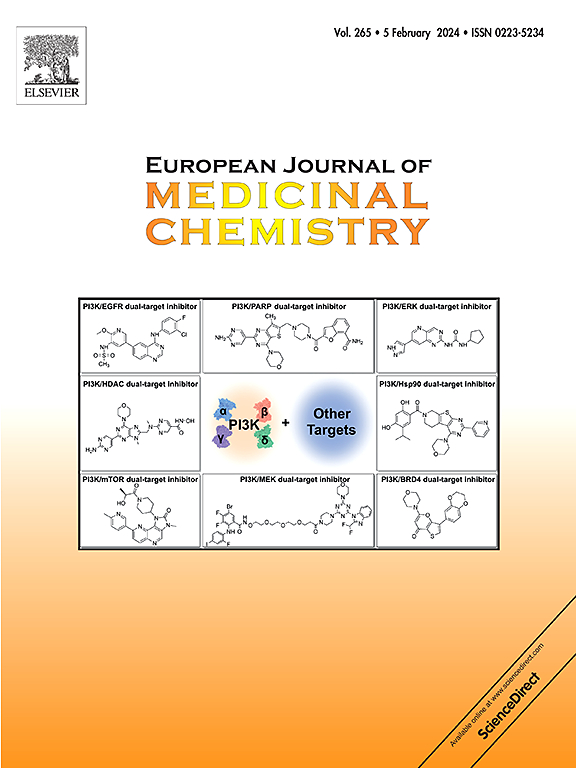Design, synthesis and biological evaluation of dapsone derivatives with broad-spectrum antiviral activity
IF 6
2区 医学
Q1 CHEMISTRY, MEDICINAL
引用次数: 0
Abstract
Inhibition of STAT2 degradation has emerged as a promising strategy for flaviviruses. The NS5 protein of the ZIKV and DENV-2 inhibits the IFN-Ⅰ antiviral response by degrading STAT2, thereby evading the host's immune defense. Therefore, the development of novel agents capable of inhibiting STAT2 degradation via targeted modulation constitutes a pivotal therapeutic strategy for controlling viral infections. In this study, HEK293TSTAT2−mCherry-Flag/rtTA−HA-NS5 cells were used as reporter tools. Through screening the ZINC drug-like database, the lead compound ZINC000060514583 was obtained and structurally modified to yield the optimized compounds SMU-1k, which significantly inhibited the degradation of STAT2. We verified its activity against ZIKV and DENV-2 through Western blotting, RT-qPCR, plaque formation assays, and immunofluorescence experiments. The results showed that SMU-1k significantly inhibited the expression of NS5 protein and restored the level of STAT2 to a certain extent. Additionally, the EC50 values of SMU-1k against ZIKV and DENV-2 were 7.08 ± 0.06 μM and 3.96 ± 0.11 μM, respectively, which helped to alleviate the cytopathic effects caused by ZIKV and DENV-2 infection. Here, we have successfully characterized a novel small-molecule compound that selectively blocks STAT2 proteasomal degradation while exhibiting potent dual antiviral efficacy against both ZIKV and DENV-2, thereby revealing a promising lead candidate for developing broad-spectrum antiviral therapeutics.


具有广谱抗病毒活性的氨苯砜衍生物的设计、合成及生物学评价
抑制STAT2的降解已成为黄病毒的一种有前途的策略。ZIKV和DENV-2的NS5蛋白通过降解STAT2抑制IFN-Ⅰ抗病毒反应,从而逃避宿主的免疫防御。因此,开发能够通过靶向调节抑制STAT2降解的新型药物是控制病毒感染的关键治疗策略。本研究以HEK293TSTAT2-mCherry-Flag/rtTA-HA-NS5细胞作为报告细胞工具。通过筛选锌类药物数据库,得到先导化合物ZINC000060514583,并对其进行结构修饰,得到优化后的化合物SMU-1k,该化合物显著抑制STAT2的降解。我们通过Western blotting、RT-qPCR、斑块形成实验和免疫荧光实验验证了其对ZIKV和DENV-2的活性。结果显示,SMU-1k显著抑制NS5蛋白的表达,并在一定程度上恢复STAT2水平。此外,SMU-1k对ZIKV和DENV-2的EC50值分别为7.08±0.06 μM和3.96±0.11 μM,有助于减轻ZIKV和DENV-2感染引起的细胞病变。在这里,我们已经成功地表征了一种新的小分子化合物,它可以选择性地阻断STAT2蛋白酶体降解,同时对ZIKV和DENV-2表现出强大的双重抗病毒功效,从而揭示了开发广谱抗病毒治疗的有希望的主要候选药物。
本文章由计算机程序翻译,如有差异,请以英文原文为准。
求助全文
约1分钟内获得全文
求助全文
来源期刊
CiteScore
11.70
自引率
9.00%
发文量
863
审稿时长
29 days
期刊介绍:
The European Journal of Medicinal Chemistry is a global journal that publishes studies on all aspects of medicinal chemistry. It provides a medium for publication of original papers and also welcomes critical review papers.
A typical paper would report on the organic synthesis, characterization and pharmacological evaluation of compounds. Other topics of interest are drug design, QSAR, molecular modeling, drug-receptor interactions, molecular aspects of drug metabolism, prodrug synthesis and drug targeting. The journal expects manuscripts to present the rational for a study, provide insight into the design of compounds or understanding of mechanism, or clarify the targets.

 求助内容:
求助内容: 应助结果提醒方式:
应助结果提醒方式:


